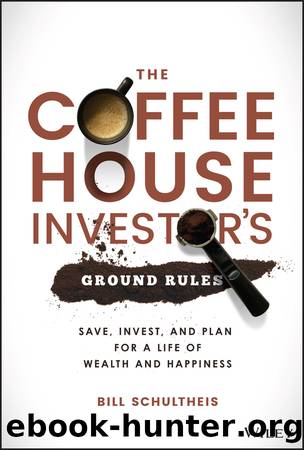The Coffeehouse Investor's Ground Rules by Bill Schultheis

Author:Bill Schultheis [Schultheis, Bill]
Language: eng
Format: epub
ISBN: 9781119717119
Publisher: Wiley
Published: 2020-11-24T00:00:00+00:00
John Armstrong was actually the pen name used by Vanguard founder John Bogle, who, at the time, was a rising star with the Wellington Management Company, a mutual fund firm.
Over the next decade, the idea of an unmanaged investment company continued to percolate on Wall Street and in Academia, led by a band of free-market economists at the University of Chicago.
Utilizing added computing power that was now available, researchers were able to quantify what had been largely theory: that professional stock pickers have a hard time consistently outperforming benchmark indices.
This observation became known as the Efficient Market Hypothesis, a concept we discussed in Chapter 4. Stock prices reset throughout the day by the countless transactions of investors who weigh in on a company's future. The result? Much of the company's future is already (and efficiently) priced into a stock's price.
Despite the growing focus on efficient markets, the 1960s were tagged the âGo-Goâ years by market pundits, and professional stock pickers continued to dominate Wall Street. Behind the scenes, work was unfolding to implement the idea of efficient markets with an unmanaged investment company by introducing an âindex fundâ type of investment to institutional investors.
In 1969, William Fouse, a manager at Mellon National Bank & Trust, tried to convince the bank's trust department to create an index trust for the bank's institutional clients. Mellon Bank chose not to pursue it, which resulted in Mr. Fouse joining Wells Fargo Bank. He and his new colleagues, including Mac McQuown, who led the technical work, established the first commercially available index investment for the pension plan of the Samsonite Luggage company.
While the index fund concept was unfolding with institutional accounts, retail investors like you and me were left out.
In 1973, Burton Malkiel wrote his A Random Walk Down Wall Street, bringing the idea of efficient markets to individual investors. His writing served as a catalyst for John Bogle at Vanguard to create the first index fund for retail investors in 1976.
Vanguard's index fund was roundly criticized throughout Wall Street, but started to capture the attention of investors in the years that followed.
In 1981, while Vanguard was growing its S&P 500 index fund, two graduates of the University of Chicago, Rex Sinquefield and David Booth, started a company called Dimensional Fund Advisors (DFA).6 Armed with research showing the historical benefits of diversifying a common stock portfolio beyond large company stocks, they built an index fund focused on small-company stocks.
Rolf Banz, also from the University of Chicago, found that small-company stocks generated higher returns than large-company stocks, and suggested that this anomaly occurred because small-company stocks were riskier, and thus investors demanded a higher return for owning these companies.
Here is where the world of Wall Street and Academia gets interesting.
Efficient market theorists suggest that you can't consistently beat the market, but if you own riskier stocks, you can beat the market. In other words, you can't beat the market, but you can beat the market.
Have I got that straight?
Somewhere, somehow, Wall Street has come unwound. Over the years the pursuit of the top stock picker has morphed into the pursuit of the top index fund.
Download
This site does not store any files on its server. We only index and link to content provided by other sites. Please contact the content providers to delete copyright contents if any and email us, we'll remove relevant links or contents immediately.
Rich Dad Poor Dad by Robert T. Kiyosaki(6607)
Pioneering Portfolio Management by David F. Swensen(6288)
How To Win Friends and Influence People by Dale Carnegie(4498)
The Money Culture by Michael Lewis(4198)
The Dhandho Investor by Mohnish Pabrai(3758)
The Wisdom of Finance by Mihir Desai(3731)
Liar's Poker by Michael Lewis(3441)
Fooled by Randomness: The Hidden Role of Chance in Life and in the Markets by Nassim Nicholas Taleb(3105)
The ONE Thing by Gary Keller(3063)
The Intelligent Investor by Benjamin Graham Jason Zweig(3035)
Mastering Bitcoin: Programming the Open Blockchain by Andreas M. Antonopoulos(3035)
The Psychology of Money by Morgan Housel(2970)
Investing For Dummies by Eric Tyson(2948)
Rich Dad Poor Dad: What The Rich Teach Their Kids About Money - That The Poor And Middle Class Do Not! by Robert T. Kiyosaki(2948)
How to Day Trade for a Living: Tools, Tactics, Money Management, Discipline and Trading Psychology by Andrew Aziz(2942)
How to Win Friends and Influence People by Dale Carnegie(2906)
Market Wizards by Jack D. Schwager(2696)
How to Pay Zero Taxes, 2018 by Jeff A. Schnepper(2646)
Zero Hour by Harry S. Dent Jr. & Andrew Pancholi(2644)
